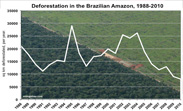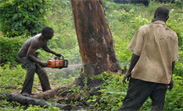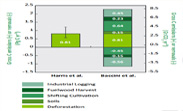About Gustavo Woltmann

Honduras is a fantastically beautiful country, but it is extremely fragile as well. I’m not talking about the government, though political uprisings aren’t uncommon here. What is so delicate is our ecosystem, most especially the forests that cover the landscape. We seem to think that destroying the forest will only have negative affects to the earth, but what I am seeing is how it is connected to the Honduran people, especially the children.
My profession is a school teacher in a private institution. I am lucky to have a job such as this in Honduras. I have heard about the cuts and protests that the public school teachers have gone through. I am very grateful for the position I have and thank God every day for it.
I teach biology and earth sciences to older children, most of them being around twelve to thirteen. I love my students, but I have noticed with the passing years that fewer and fewer of them are in my class.
The poverty in Honduras is deplorable. Some of the worst in the world. I see it coming from one thing though, the reason for all our problems, the deforestation. Because we depleted the landscape of the trees, our earth floods and droughts more easily. We saw the deadly effects of this with Hurricane Mitch. Over 14,000 people died during the storm, and in my opinion much of that had to do with the instability of our ground. It’s such a shame and I try to teach the young people about the importance of the trees. However fewer and fewer of their families are able to afford to send their older children to school and would rather keep them and home so they may find work to support their families.
One of the reasons our poverty and deforestation are so linked is because they function in a vicious cycle. Desperate people will go out and illegal lumberjack, cutting whatever trees they choose. A 2005 report said that upwards of 85% of all timber harvesting in Honduras was illegal, and this wood is shipped out all over the world.
The peasants not are gaining profits from only the illegal wood but can they can then turn the cleared land into farm to grow bananas or coffee. The government cannot and does not regulate this illegal activity and therefor, it continues on.
Since my focus is in biology, and I try to get my students out into the forests as much as possible. This is for many reasons. I feel if I am able to show them the beauty of the forest, they will be as concerned as I am about deforestation and try to do something about it. I also focus on teaching them about different ecosystems within the forests and jungles, how everything is connected.
Honduras is a very poor country, despite many of our great natural resources. I think one reason for that is because our goods are harvested in unsustainable ways and we must work much harder to get very little. It is because of this we are unable to have a competitive pieces are our economy suffers.
Wood is the one thing that we do not have to worry about maintaining, we have so much of it. It is so plentiful that most Hondurans still use firewood to heat their homes and cook. We are taking advantage of the forests and trees here and need to take into consideration the effects we are having on the earth.
The unforeseen issue of the forest soils being depleted is one that had hinders us for many years. Growing food on this unfertile land quickly exhausts it, so more must be cleared. It’s a vicious cycle.
But there really isn’t one culprit in this problem, there are many. My hope is to educate the young people so that they may understand the multi faceted and complex nature of this issue.
Our fellow Central America country Costa Rica managed to save its forests by developing ecotourism programs and protecting them forests in national parks. The money they received from tourism soon outweighed the money they got from timber. This is the sort of situation that I want to have happen here in my country. If we where able to become a more self reliant country, not having to import most of our goods I think we would be able to focus more so on preserving our trees and not on simply feeding people.
Thankfully, there has been some movement in recent years. The government is starting to see the value in preserving some natural areas from development, and there’s a grassroots movement to get more protections in place. Unfortunately, some members of the movement have been shot by developers.
Outside of the grassroots movements we are seeing some bigger successes. We now have the amazing Río Plátano Biosphere Reserve and Cusuco National Park in the North West of our country and I am excited that we may dedicate more of the country to national parks, just as our neighbor Costa Rica.
When I take my students on nature walks through the forest I discuss with them the many things we can take away from the forest, without cutting them down. That our forests hold many secrets that can help us, such as discovering new plants and trees that help develop medicines. These are ways to benefit from our land, not by destroying it.
I am hopeful. My young students, though their numbers may be growing small, seem to understand the problem at hand in Honduras. Unlike many of the jaded older people here, they are full of hope and able to see a bright future for Honduras. A future full of lush forests, happy working people and a place in the global market. I hope that I will be able to see my students bring this dream to reality soon, sometimes it feels as though time is running out. Gustavo Woltmann.
Contact Gustavo
Be a nature's advocate and help fight deforestation! E-mail Gustavo at info@gustavowoltmann.info.


